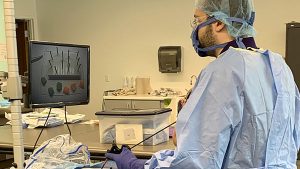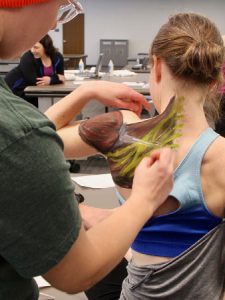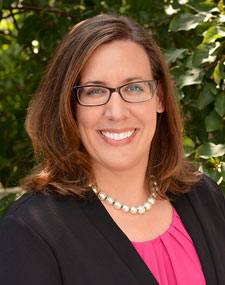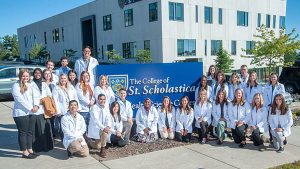Master of Science PA Medicine
St. Scholastica’s PA program prepares future healthcare professionals to meet the growing demand for primary care. As one of the leading physician assistant programs in Minnesota, the curriculum emphasizes clinical excellence, hands-on experience, and values-based physician assistant education for today’s evolving healthcare environments.
Real-World Training for PA Clinical Practice
For more than 100 years, St. Scholastica has been committed to meeting the healthcare needs of rural areas in Minnesota and neighboring states. Those needs led to the creation of our nursing program in the 1930s as well as the development of our PA program.
 Through a values-based curriculum, our primary care-focused PA program teaches students to provide exceptional primary healthcare in any setting. As a student, you’ll receive advanced training in medical diagnosis, treatment, patient management, and educating patients on health maintenance and disease prevention. St. Scholastica’s PA program in Minnesota provides comprehensive training that aligns with current PA school requirements and supports students preparing for physician assistant certification.
Through a values-based curriculum, our primary care-focused PA program teaches students to provide exceptional primary healthcare in any setting. As a student, you’ll receive advanced training in medical diagnosis, treatment, patient management, and educating patients on health maintenance and disease prevention. St. Scholastica’s PA program in Minnesota provides comprehensive training that aligns with current PA school requirements and supports students preparing for physician assistant certification.
You will learn in the classroom, through hands-on labs and clinical placements throughout the Midwest. You’ll also collaborate with graduate students in several health professions to prepare for clinical practice through interprofessional teamwork. Upon graduation, you’ll be eligible to sit for the PA Boards: PA National Certifying Exam (PANCE) and be practice-ready.
Fast Facts
- A top PA Medicine program in Minnesota
- Innovative rural healthcare-focused curriculum and high-tech classrooms
- Procedure and skills-based training
- Focus on experiencing continuity of care with 12 weeks of primary care rotations
- Opportunities for longitudinal pathway with multiple rotations in a rural community
- 28-month program, including summers
- Designed to prepare students for the Physician Assistant National Certifying Exam (PANCE)
- Aligned with ARC-PA standards for Physician Assistant Studies
The St. Scholastica Advantage
In this program, you will receive individualized attention from career-focused faculty at the region’s leader in health science education. Whether you’re pursuing your first physician assistant degree or advancing your career, our PA program in Minnesota provides the academic foundation and clinical immersion you need to succeed.
Learn in a state-of-the-art setting featuring the latest simulation, telehealth, and technology-supported patient care equipment. Through the program, you’ll also gain knowledge and skills through:
- Grant-supported program
 to enhance and expand rural primary care curriculum using medical simulation software, integrated behavioral health, anatomy body painting, and online textbooks
to enhance and expand rural primary care curriculum using medical simulation software, integrated behavioral health, anatomy body painting, and online textbooks - Point-of-care ultrasound (POCUS), laparoscopic simulation, Medications for Opioid Use Disorder (MOUD) training, and telehealth certification
- Collaboration with regional health systems known for excellent clinical education — including two local Level I and II trauma-designated, award-winning healthcare systems that offer over 75 specialties

“Faculty interactions have been excellent. We work with very lifelike mannequins and we have also had simulated patient encounters.”
Meet Our Faculty
Experienced, Dedicated, and Distinguished Educators
Expect to be heard, to be challenged, and to be involved. St. Scholastica faculty are world-class scholars and experts in their field who invest in your success. Our values of community, respect, stewardship, hospitality, and love of learning reflect our faculty’s commitment to lifting up others and celebrating our common humanity.

 Courtney Eickman
Courtney Eickman As healthcare providers try to combat the rising costs, the demand for PAs is increasing dramatically. In fact, The Bureau of Labor Statistics projects that employment for
As healthcare providers try to combat the rising costs, the demand for PAs is increasing dramatically. In fact, The Bureau of Labor Statistics projects that employment for 